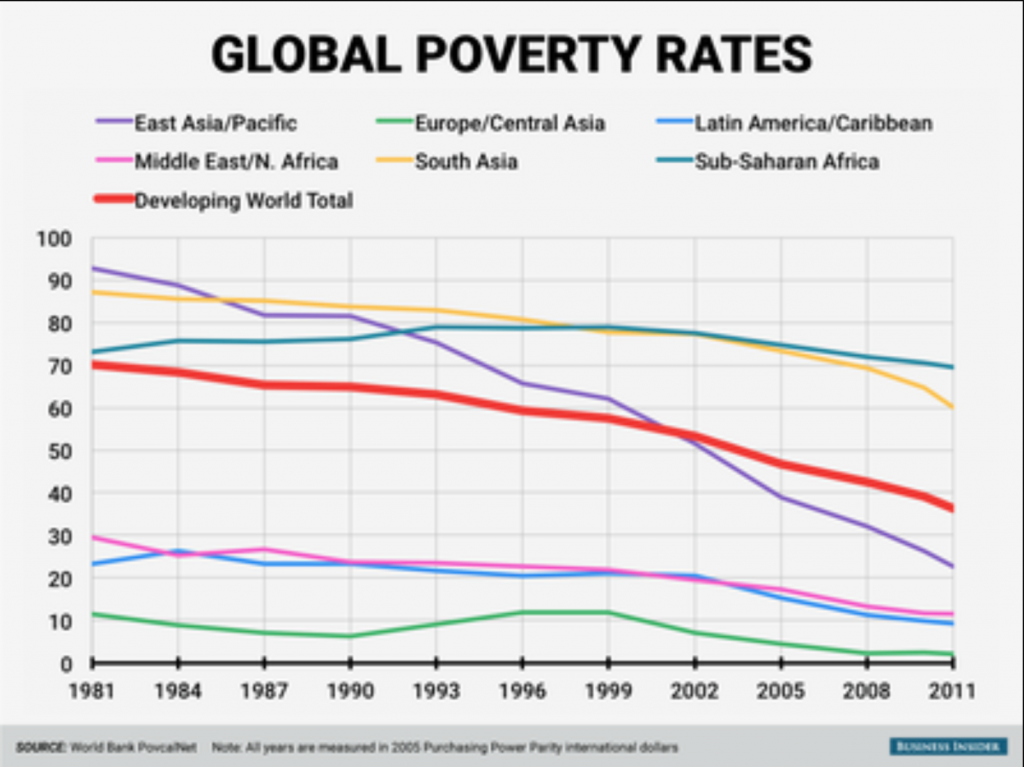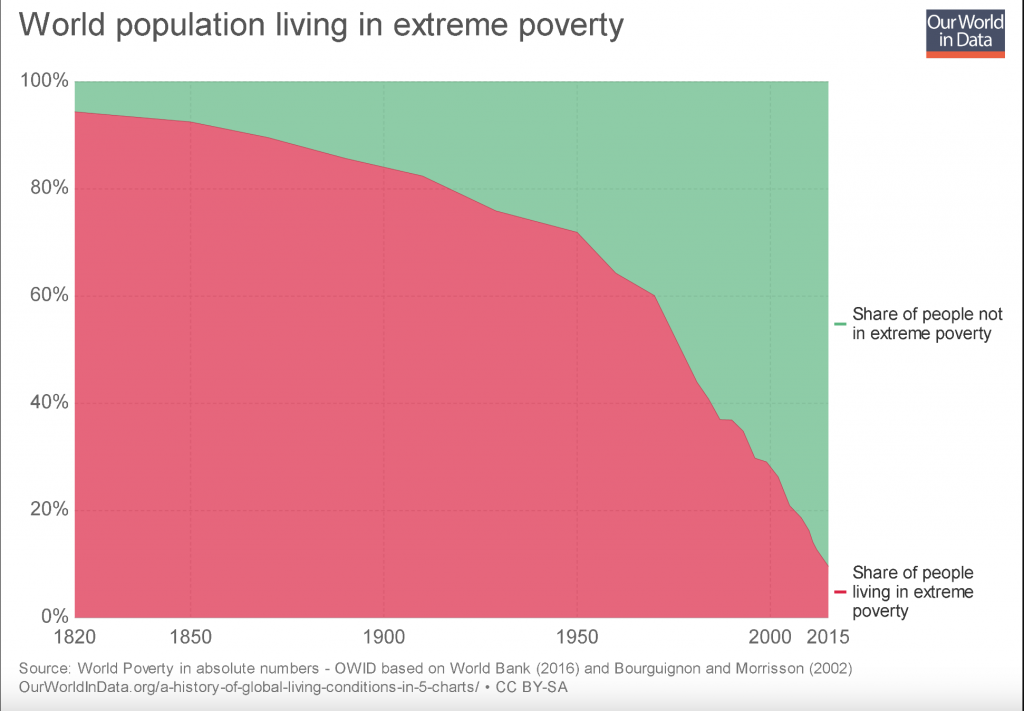It’s a fascinating notion, and one of the great fallacies of our time, that wealthy people create poverty, if nothing else, by their wealth. It’s a narrative that’s fostered over and over by the mainstream media as well as television pundits anxious to further the narrative that capitalism is the root of so many of our ills, without regard for actual fact.
This notion of wealth for one while poverty for another was rooted in the once accepted fact that if one was to get wealthy, property ownership was the way. Those who owned property could then garner workers, once called serfs, later, peasants, to do the work for them. The property owner did get wealthy, and those who worked, lived a rather meager existence, once called subsistence.
How the Tide Began to Turn
This is complicated subject, more than what needs be served in this article, but here is a primer….
This inequality due to land ownership began to be solved during the Italian Renaissance. Italian merchants in the Venetian territories (Genoa as well), were among the first to sell spices throughout the European landscape, an becoming quite wealthy in the process. Since the Venetians and Genoese had control of the Mediterranean trade routes, they were able to procure said spices (nutmeg, cinnamon, and most prized of all, black pepper) for sale. They made enormous profits doing so, undercutting the ancient wealth of landowners in the process.
In short, landownership, which was still a major staple of the wealthy, and a great generator of wealth, could be bypassed by the sale of goods people wanted.
This process, procuring or inventing a product people wanted and were willing to pay for, was repeated with great success throughout the world, with some becoming fabulously wealthy in the process. In short, you no longer needed to be a large landowner to become sustainable, but, rather, needed to be inventive and find or create something to sell.
The process also spurred exploration, and yes, colonization, something that has been going on since humans left their humble places of origins and moved about the earth.
All of this is a simplistic overview as poverty in the middle ages into the early modern period was significant. However, the point here is that relative wealth could be achieved even though there were others who were significantly wealthier. One did not decide the other (Fernand Braudel’s book The Wheels of Commerce is outstanding if you’re really interested in this topic).
The notion, however, that wealth inequality is what drives poverty is simply incorrect at best, and a blatant lie at worst. What capitalism has done, while yes, increasing the number of wealthy people, is lift some of the poorest among us, out of destitution, creating a life more livable in the process.
Consider:
Prior to China’s adoption of capitalist principles in the 1980’s, it was one of the poorest nations on the planet. Mao’s version of Communism, by his own admission, was not only counter-productive, it actually cost the lives of millions and set the nation back significantly. Consider that between 1950-1981, some 88% of Chinese lived in abject poverty. In 2015, that percentage was 0.7%.*
Since the adoption of more open principles of economics, some one billion people have been lifted out of destitution in that nation, suggesting the power of capitalist principles. There is no substitute for initiative nor incentive, both of which capitalism provides.
The same can be said globally. Consider the chart below:

The exception being Sub-Saharan Africa – more a problem of geography and natural resources than anything else (see Dr. Thomas Sowell).
Since most of these nations rid themselves of Marxist ideology, rates of poverty have steadily declined, despite massive corruption in some of these areas of the world. Here is another chart, illustrating the same thing:

Generally speaking, corruption and poor leadership, not wealth disparity, are the main drivers of continued poverty.
The notion that if one person becomes rich, another becomes poor is simply ludicrous in a nation that espouses capitalism as its economic system. This does not mean to suggest that capitalism is perfect–there’s corruption there too, but there is no merit to the consideration that if one gets wealthy, someone else must become poor. It is not a zero sum game.
Oxfam, an organization whose sole purpose of existence is to try and point out that very false notion of “one gets rich while someone else gets poor” targeted the world’s eight riches people in an attempt to prove their point. They failed miserably as Jeffery Dorfman pointed out in his Forbes magazine piece from January of 2017.
“These eight billionaires are all self-made and earned their wealth by selling products and services that millions of people voluntarily paid for. We, the population of the world (mostly the developed world), made these eight men unimaginably rich because we wanted what they were selling more than we wanted to keep the money that was asked for in exchange. Nothing in these voluntary exchanges has made anybody in the world poorer. “
That’s the key…they sold products “we” wanted…a voluntary exchange that made them rich. Is it no different than Taylor Swift’s offering her music to be sold, or Harrison Ford selling his talent as an actor? They have skills others want, and they profit off of it. I’m certainly no poorer because Taylor Swift is selling millions of records and becoming wealthy in the process.
There will be those reading this article saying, “What about the factory worker or the person working in fast food? The McDonald’s corporation (or Walmart, or Amazon, or…) are swimming in money…corporate profits have skyrocketed in recent years. Why is this not passed down to the workers?”
Who says they’re not? I wonder how many have looked at the starting wages of these companies or what benefits those who are employed by them receive. A few years ago, I penned an article on Jeff Bezos and Amazon, addressing this very thing. You can find it Here
The fact is many of these companies have been forced to pay more as the dearth of workers has made them “up their game”, offering more pay, better hours, as well as incentives to hire and retain workers. This pattern is quite similar to peasant wages and working conditions after the Black Death in the 14th century. There were few farm workers, so land owners were forced to pay a premium and peasants benefitted.
The notion of zero sum is rooted in Marxist ideology, and has taken root ever deeper since the 1960’s in the West, despite evidence to the contrary. Ask yourself why, if “economic equality” is the hallmark of socialism and communism why Fidel Castro died with some $800,000,000 in his personal account or why the Russian leadership ate caviar and had homes along the Black Sea while the average person struggled to make a living.
The fact is one person’s wealth does not impact another person’s ability to obtain wealth, provided the latter is creative, driven, and willing to take the risk. It’s a fallacy that needs to be ended.
*Forbes Magazine, July 8, 2019.


scalar
Great articlе.